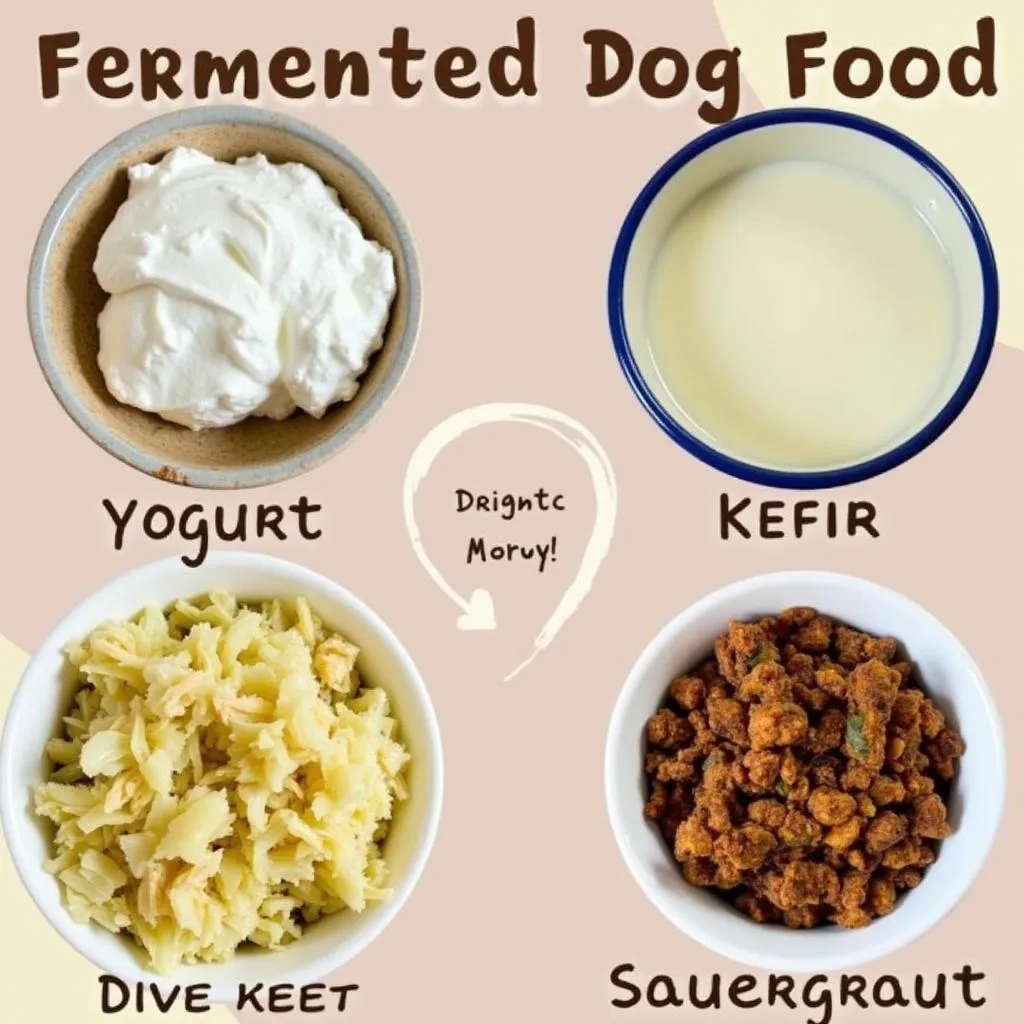“Ăn gì bổ đấy”, a Vietnamese saying highlighting the importance of a healthy diet, applies to our furry friends too. Just like us, dogs benefit from a balanced diet, and in recent years, fermented foods have become a trending topic in canine nutrition. But are fermented foods truly beneficial for our beloved pups?
What are Fermented Foods?
Fermented foods are foods that have undergone a process of transformation by beneficial bacteria, known as probiotics. During fermentation, these bacteria break down sugars and carbohydrates in the food, producing lactic acid and other beneficial compounds. This process not only changes the flavor and texture of the food but also creates a source of valuable probiotics.
Why are Fermented Foods Good for Dogs?
Benefits of Fermented Foods for Dogs
Fermented foods can offer a range of benefits for dogs, contributing to their overall well-being. Here are some key advantages:
- Improved Digestion: Probiotics in fermented foods can help restore balance to the gut microbiome, supporting healthy digestion and reducing digestive issues like diarrhea, constipation, and gas.
- Enhanced Immune System: A healthy gut microbiome plays a crucial role in immune function. Fermented foods can help strengthen the immune system by promoting the growth of beneficial bacteria, which fight off harmful pathogens.
- Reduced Inflammation: Dr. Nguyễn Văn Minh, a leading veterinarian in Hanoi, believes that fermented foods can help reduce inflammation throughout the body. In his book, “Healthy Canine Companion”, he notes that fermented foods are rich in anti-inflammatory compounds.
- Improved Nutrient Absorption: The fermentation process breaks down complex carbohydrates, making nutrients more readily available for absorption by the dog’s body.
- Enhanced Mental Clarity: Some studies suggest that probiotics may have a positive impact on brain function, potentially improving mood and cognitive function in dogs.
Fermented Foods You Can Give Your Dog
Safe Fermented Foods for Canines
There are several types of fermented foods that are safe for dogs to consume, but always consult with your veterinarian before introducing any new foods to your dog’s diet. Here are some popular options:
- Yogurt: Plain, unsweetened yogurt is a good source of probiotics for dogs. However, choose yogurt specifically made for dogs or plain yogurt with live and active cultures. Avoid yogurt with added sugar, artificial sweeteners, or flavors.
- Kefir: A fermented milk drink similar to yogurt, kefir offers a wider range of probiotics and can be enjoyed by dogs. Look for plain, unsweetened kefir, or make your own with a kefir starter culture.
- Sauerkraut: This fermented cabbage is a good source of vitamin C and beneficial bacteria. Choose plain, unsweetened sauerkraut and introduce it to your dog’s diet gradually.
- Pickles: Fermented pickles can be a healthy treat for dogs in moderation. Avoid pickles with added sugar or artificial sweeteners.
- Kimchi: This spicy fermented Korean dish can be a good source of probiotics for dogs. Choose kimchi that’s not too spicy or salty, and offer it in small amounts.
 A bowl of healthy fermented dog food with ingredients like yogurt, sauerkraut, and kefir
A bowl of healthy fermented dog food with ingredients like yogurt, sauerkraut, and kefir
What About Homemade Fermented Foods?
If you’re interested in creating your own fermented treats for your furry friend, there are several online resources available with detailed recipes and instructions. For example, you can find a simple recipe for homemade fermented dog biscuits on our website.
Can Fermented Foods be Harmful to My Dog?
While fermented foods offer numerous benefits, it’s important to be aware of potential risks:
- High Sodium: Some fermented foods, such as pickles and kimchi, can be high in sodium. This can be harmful to dogs, especially those with pre-existing health conditions like heart disease or kidney disease.
- Gastrointestinal Upset: Introducing fermented foods too quickly or in large quantities can cause digestive upset in some dogs. Start with small amounts and increase gradually.
- Allergic Reactions: Some dogs may be allergic to certain ingredients in fermented foods. It’s always best to introduce new foods slowly and monitor for any signs of allergies.
Considerations for Fermented Foods for Dogs
Here are some important considerations to keep in mind:
- Consult Your Veterinarian: It’s essential to consult with your veterinarian before adding fermented foods to your dog’s diet, especially if they have any pre-existing health conditions.
- Quality Matters: Choose fermented foods specifically made for dogs or high-quality fermented foods intended for human consumption that are free from added sugars, preservatives, and artificial ingredients.
- Start Small: Introduce fermented foods to your dog’s diet gradually. Begin with small amounts and increase gradually to allow your dog’s digestive system to adjust.
- Observe Your Dog: Monitor your dog for any adverse reactions, such as digestive upset, allergies, or changes in behavior.
Conclusion
Fermented foods can be a healthy and beneficial addition to your dog’s diet, promoting gut health, boosting the immune system, and supporting overall well-being. Just remember to choose high-quality fermented foods, introduce them gradually, and always consult with your veterinarian to ensure your dog’s safety and well-being.
Are you ready to explore the world of fermented foods for your dog? Share your thoughts and questions in the comments below. If you need any further assistance, feel free to contact us at 0372960696, email us at [email protected], or visit our store at 260 Cầu Giấy, Hà Nội. We have a team of pet care experts ready to help you 24/7.
Leave a Reply
You must be logged in to post a comment.